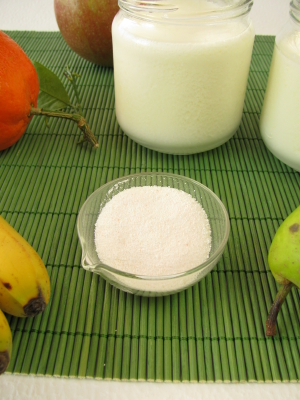Balanced Living
Healthy Gut, Healthy Body
Posted by Arja on August 9 in Nutrition
A healthy digestive system is the foundation of good health. It helps you to digest food and absorb nutrients, eliminates toxins, acts as a line of defence for your immune system, and even produces some vitamins. When things go wrong, you experience gas, bloating, diarrhea, and even constipation. Maintaining the health of your digestive system is vitally important, and when things get out of balance using a probiotic may be the best thing that you can do to help the good bacteria take back control.

There are over 400 species of bacteria living within your body starting at your mouth, going through your stomach, intestines, and urogenital tract. For the most part, despite the fact that there is a mix of “good” (probiotic) and “bad” (pathogenic) bacteria, they all manage to live in harmony with one another. While pathogenic bacteria is the cause of digestive distress, probiotic bacteria has a laundry list of important roles, starting with keeping bad bacteria in check and inhibiting its growth to prevent illness and disease.
Probiotic bacteria in the gut helps digest lactose (and some forms of fibre), which is why many people with lactose intolerance can eat yoghurt. It also produces many of the B vitamins which are critical for energy production, metabolism, and balanced mood. Probiotics maintain a healthy digestive tract, alleviating constipation and diarrhea, and protecting the gastrointestinal tract lining. By promoting a healthy immune system, probiotics also play a role in preventing colds, flu, and other illnesses. They can also help treat many allergic, inflammatory and chronic diseases. With all of these positive, health-promoting qualities it’s no wonder we’re seeing probiotics added to everything from yoghurt, to cereal, and even some juices!
Not all probiotics are created equal, and just because a chocolate bar contains them it doesn’t actually make it any better for you. Bad bacteria in the gut feeds on things like simple sugars, so if you’re eating a product laden with sugar and hoping to get some benefit from the probiotics that have been added, and then you’re wasting your money. Some of the best natural sources of probiotic bacteria include fermented foods like plain yoghurt, kefir (a yoghurt drink), sauerkraut, kombucha tea, and even some cheese. Many types of yoghurt on the market these days also have extra probiotic cultures added to them, which marketing campaigns are quick to point out. There are also a whole slew of other products out there (cereals, granola bars, juice, and even pizza!) that have probiotics and prebiotics (food for good bacteria) added to them, but again, you need to watch for things like added sugar (along with other unsavoury additives).
If you’re suffering from digestive upset, or trying to replace the good bacteria that has been wiped from your system after taking a round of antibiotics (oh yes, antibiotics wipe out the good AND the bad), then the amount of probiotics added to food won’t be enough. Probiotics amounts in supplements are measured in CFUs (colony forming units) and when shopping for a good quality probiotic supplement there are a few things to consider in order to get the biggest bang for your buck. First is potency; make sure you’re getting a minimum of 100 million CFUs per dose. The second is storage; most probiotics require refrigeration, although there are some products in “pearl” format that are shelf stable and more suitable for things like travelling. Third is the expiry date; a good manufacturer will guarantee a certain potency until the product’s expiry date and will list this right on the packaging. Probiotics aren’t cheap, but smart shopping will help you navigate the supplement aisles and choose the best product.
There are different species of probiotics that are more suited to help manage different conditions, but for the most part, if you choose a product that contains a few different species you will more than likely feel beneficial results. There are probiotics specifically designed for children, and I encourage you to consider adding them to your child’s diet, especially as they head back to school, to help boost their immune system. Probiotics can last in the gut for anywhere from 7-14 days, depending on which study you read. I usually recommend that my clients take them on a regular basis for 1-2 months to re-establish healthy gut bacteria, and then settle into a routine of taking them for 2 weeks every month, and after a bout of illness (especially where antibiotics were taken).
For more information on some of the best brands to choose, or for how to use probiotics for specific health conditions, feel free to contact me and book a session!



